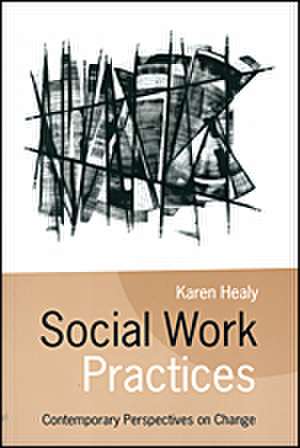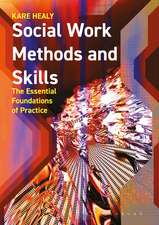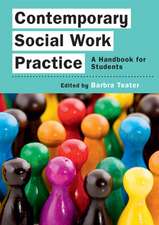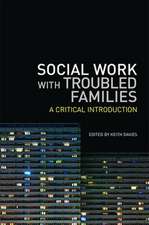Social Work Practices: Contemporary Perspectives on Change
Autor Karen Healyen Limba Engleză Paperback – 17 noi 1999
It should serve its purpose well in prompting educators, policy-makers and practitioners to begin to take on board the critique of dominant approaches to social work theory and to help us guard against the dangers of dogmatism and orthodoxy' - European Journal of Social Work
`Karen Healy profoundly challenges, in the context of the postmodernity of late capitalism, many of the assumptions upon which the critical tradition in social work has been founded. This is a book which interrogates not only the emancipatory metanarratives of left perspectives from her position within the left, but also questions many of the received ideas about her professional power and identity, and about the kinds of social work practices necessary in order to continue to pursue welfare as an emancipatory project under transformed ideological and material circumstances. This is a most significant contribution to the debates which confront social work, worldwide, at the present time' - Peter Leonard, McGill University, Canada
How should social workers be responding to the crises which beset the welfare states of the 21st century? Could postmodern theory provide some of the answers?
This original and stimulating book provides a critical review of contemporary social work theory and considers its relevance for professional practice. Karen Healy outlines critical theoretical perspectives - including feminist, Marxist and radical social work - and indicates their implications for social work practice. She explains contemporary debates on post-structuralism and postmodernism and shows how their application to everyday social work practice would point to a new pragmatism focused on local, contextual and incremental proposals for change. By referring to actual examples, she invites the reader to consider the potential for relevant and diverse forms of social work practice informed by postmodern theory.
This accessible and engaging book makes an important contribution to contemporary debates on social work theory and practice. It will be important reading for students and academics in social work and social policy.
Preț: 487.98 lei
Preț vechi: 574.09 lei
-15% Nou
Puncte Express: 732
Preț estimativ în valută:
93.39€ • 97.24$ • 78.93£
93.39€ • 97.24$ • 78.93£
Carte tipărită la comandă
Livrare economică 10-24 martie
Preluare comenzi: 021 569.72.76
Specificații
ISBN-13: 9780761962724
ISBN-10: 0761962727
Pagini: 176
Dimensiuni: 156 x 234 x 10 mm
Greutate: 0.26 kg
Ediția:1
Editura: SAGE Publications
Colecția Sage Publications Ltd
Locul publicării:London, United Kingdom
ISBN-10: 0761962727
Pagini: 176
Dimensiuni: 156 x 234 x 10 mm
Greutate: 0.26 kg
Ediția:1
Editura: SAGE Publications
Colecția Sage Publications Ltd
Locul publicării:London, United Kingdom
Recenzii
`Karen Healy has written a very interesting and worthwhile book that explores the relevance and significance of postmodern theory to social work. It provides a well-argued account of recent developments in social work theory… However, it is not simply an account of theory, as considerable effort goes into making links between the theory and its implications for practice. …[I]t offers a sound foundation for exploring issues of theory and practice.
A major strength of the book is that it shows that some of the significant flaws in earlier attempts to develop critical approaches to practice should not lead us to assume that radical approaches are necessarily oppressive in themselves, or doomed to failure…
It should serve its purpose well in prompting educators, policy-makers and practitioners to begin to take on board the critique of dominant approaches to social work theory and to help us guard against the dangers of dogmatism and orthodoxy' - European Journal of Social Work
`Karen Healey profoundly challenges, in the context of the postmodernity of late capitalism, many of the assumptions upon which the critical tradition in social work has been founded. This is a book which interrogates not only the emancipatory metanarratives of left perspectives from her position within the left, but also questions many of the received ideas about her professional power and identity, and about the kinds of social work practices necessary in order to continue to pursue welfare as an emancipatory project under transformed ideological and material circumstances. This is a most significant contribution to the debates which confront social work, worldwide, at the present time' - Peter Leonard, McGill University
It should serve its purpose well in prompting educators, policy-makers and practitioners to begin to take on board the critique of dominant approaches to social work theory and to help us guard against the dangers of dogmatism and orthodoxy' - European Journal of Social Work
`Karen Healey profoundly challenges, in the context of the postmodernity of late capitalism, many of the assumptions upon which the critical tradition in social work has been founded. This is a book which interrogates not only the emancipatory metanarratives of left perspectives from her position within the left, but also questions many of the received ideas about her professional power and identity, and about the kinds of social work practices necessary in order to continue to pursue welfare as an emancipatory project under transformed ideological and material circumstances. This is a most significant contribution to the debates which confront social work, worldwide, at the present time' - Peter Leonard, McGill University
Cuprins
Social Work
Contemporary Challenges
The Legacy of Our Past and the Nature of Our Present
Foucault, Feminism and the Politics of Emancipation
Critical Social Work Responses to `Post' Theories
Rethinking Professional Power and Identity
Liberation or Regulation
Interrogating the Practices of Change
Reconstructing Critical Practices
Conclusions
Contemporary Challenges
The Legacy of Our Past and the Nature of Our Present
Foucault, Feminism and the Politics of Emancipation
Critical Social Work Responses to `Post' Theories
Rethinking Professional Power and Identity
Liberation or Regulation
Interrogating the Practices of Change
Reconstructing Critical Practices
Conclusions
Notă biografică
Descriere
This original and stimulating book provides a critical review of contemporary social work theory and considers its relevance for professional practice. Karen Healy outlines critical theoretical perspectives - including feminist, marxist and radical social work - and indicates their implications for social work practice. She goes on to explain contemporary debates on post-structuralism and postmodernism and shows how their application to everyday social work practice would point to a new pragmatism focused on local, contextual and incremental proposals for change. By referring to actual examples, the reader is invited to consider the potential for relevant and diverse forms of social work practice informed by postmodern theory.













